Professional Development Plan Template for Healthcare Professionals
VerifiedAdded on 2023/03/17
|6
|1219
|40
Homework Assignment
AI Summary
This document presents a comprehensive professional development plan template designed to guide individuals in healthcare professions. The plan begins with goal setting, encompassing both personal and professional aspirations over various timeframes. It then proceeds to a detailed self-analysis, evaluating strengths and weaknesses in both clinical/professional and personal/non-clinical domains, considering required skills and identifying gaps. The core of the plan focuses on identifying areas for improvement, setting specific objectives, and outlining actionable learning and development activities. These activities include courses, mentorship, and practical experience, with details on providers, resources, and associated costs. The plan also incorporates a record of work priorities and learning progress, documenting key learning outcomes and next steps. References to relevant literature support the plan's foundation in evidence-based practice. The template is designed to facilitate continuous professional growth, ensuring a structured approach to career advancement in the healthcare field.
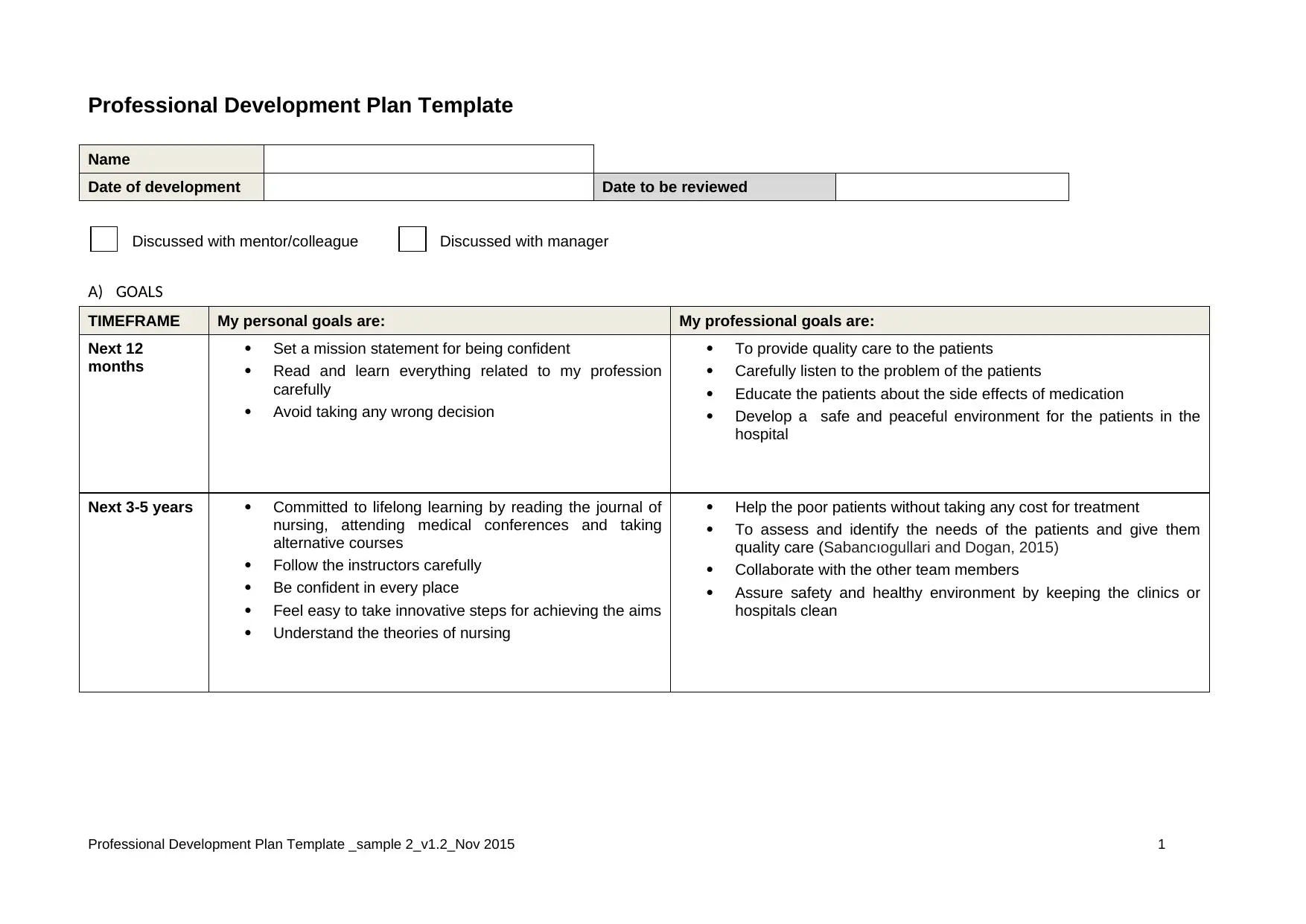
Professional Development Plan Template
Name
Date of development Date to be reviewed
Discussed with mentor/colleague Discussed with manager
A) GOALS
TIMEFRAME My personal goals are: My professional goals are:
Next 12
months
Set a mission statement for being confident
Read and learn everything related to my profession
carefully
Avoid taking any wrong decision
To provide quality care to the patients
Carefully listen to the problem of the patients
Educate the patients about the side effects of medication
Develop a safe and peaceful environment for the patients in the
hospital
Next 3-5 years Committed to lifelong learning by reading the journal of
nursing, attending medical conferences and taking
alternative courses
Follow the instructors carefully
Be confident in every place
Feel easy to take innovative steps for achieving the aims
Understand the theories of nursing
Help the poor patients without taking any cost for treatment
To assess and identify the needs of the patients and give them
quality care (Sabancıogullari and Dogan, 2015)
Collaborate with the other team members
Assure safety and healthy environment by keeping the clinics or
hospitals clean
Professional Development Plan Template _sample 2_v1.2_Nov 2015 1
Name
Date of development Date to be reviewed
Discussed with mentor/colleague Discussed with manager
A) GOALS
TIMEFRAME My personal goals are: My professional goals are:
Next 12
months
Set a mission statement for being confident
Read and learn everything related to my profession
carefully
Avoid taking any wrong decision
To provide quality care to the patients
Carefully listen to the problem of the patients
Educate the patients about the side effects of medication
Develop a safe and peaceful environment for the patients in the
hospital
Next 3-5 years Committed to lifelong learning by reading the journal of
nursing, attending medical conferences and taking
alternative courses
Follow the instructors carefully
Be confident in every place
Feel easy to take innovative steps for achieving the aims
Understand the theories of nursing
Help the poor patients without taking any cost for treatment
To assess and identify the needs of the patients and give them
quality care (Sabancıogullari and Dogan, 2015)
Collaborate with the other team members
Assure safety and healthy environment by keeping the clinics or
hospitals clean
Professional Development Plan Template _sample 2_v1.2_Nov 2015 1
Paraphrase This Document
Need a fresh take? Get an instant paraphrase of this document with our AI Paraphraser
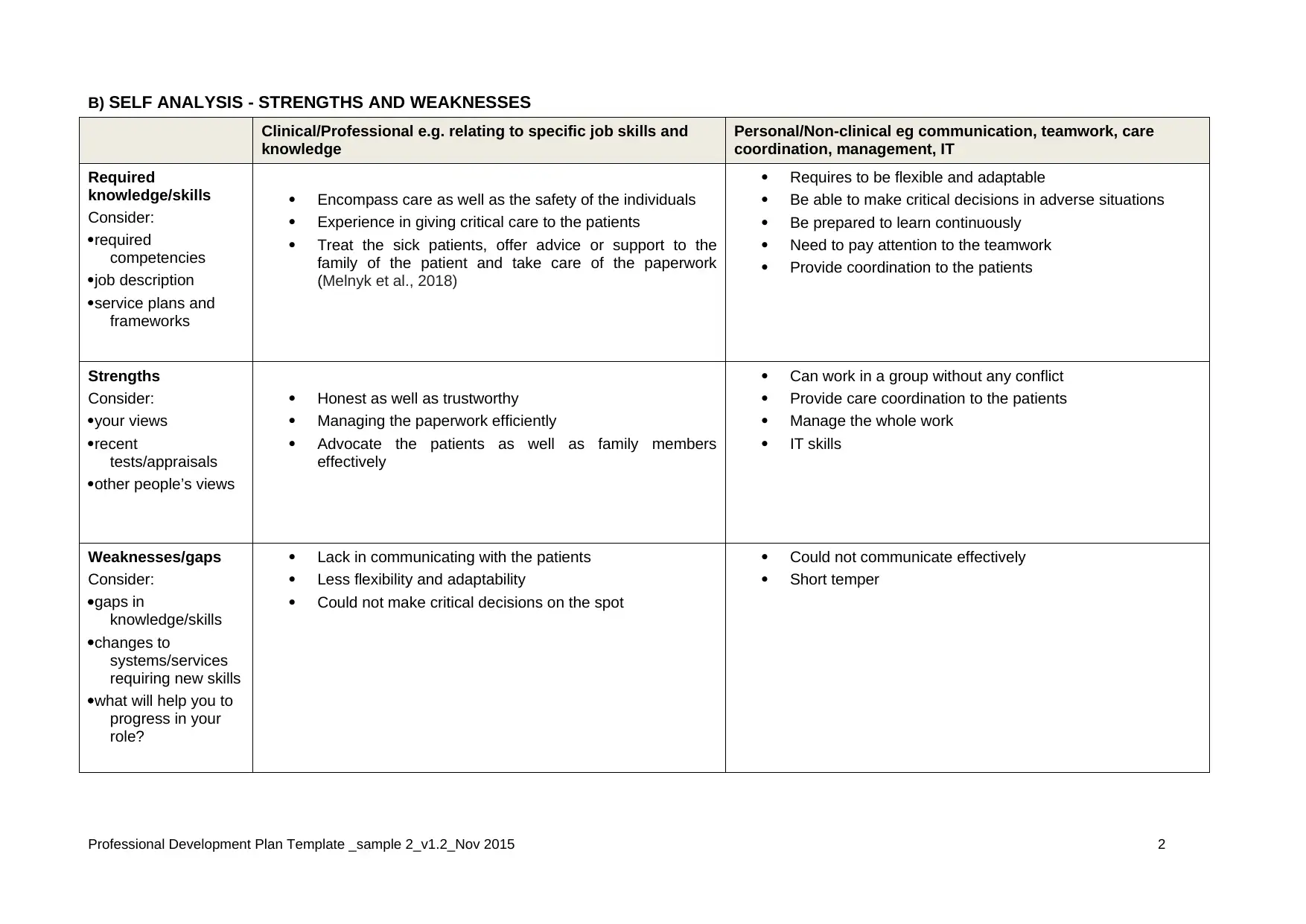
B) SELF ANALYSIS - STRENGTHS AND WEAKNESSES
Clinical/Professional e.g. relating to specific job skills and
knowledge
Personal/Non-clinical eg communication, teamwork, care
coordination, management, IT
Required
knowledge/skills
Consider:
required
competencies
job description
service plans and
frameworks
Encompass care as well as the safety of the individuals
Experience in giving critical care to the patients
Treat the sick patients, offer advice or support to the
family of the patient and take care of the paperwork
(Melnyk et al., 2018)
Requires to be flexible and adaptable
Be able to make critical decisions in adverse situations
Be prepared to learn continuously
Need to pay attention to the teamwork
Provide coordination to the patients
Strengths
Consider:
your views
recent
tests/appraisals
other people’s views
Honest as well as trustworthy
Managing the paperwork efficiently
Advocate the patients as well as family members
effectively
Can work in a group without any conflict
Provide care coordination to the patients
Manage the whole work
IT skills
Weaknesses/gaps
Consider:
gaps in
knowledge/skills
changes to
systems/services
requiring new skills
what will help you to
progress in your
role?
Lack in communicating with the patients
Less flexibility and adaptability
Could not make critical decisions on the spot
Could not communicate effectively
Short temper
Professional Development Plan Template _sample 2_v1.2_Nov 2015 2
Clinical/Professional e.g. relating to specific job skills and
knowledge
Personal/Non-clinical eg communication, teamwork, care
coordination, management, IT
Required
knowledge/skills
Consider:
required
competencies
job description
service plans and
frameworks
Encompass care as well as the safety of the individuals
Experience in giving critical care to the patients
Treat the sick patients, offer advice or support to the
family of the patient and take care of the paperwork
(Melnyk et al., 2018)
Requires to be flexible and adaptable
Be able to make critical decisions in adverse situations
Be prepared to learn continuously
Need to pay attention to the teamwork
Provide coordination to the patients
Strengths
Consider:
your views
recent
tests/appraisals
other people’s views
Honest as well as trustworthy
Managing the paperwork efficiently
Advocate the patients as well as family members
effectively
Can work in a group without any conflict
Provide care coordination to the patients
Manage the whole work
IT skills
Weaknesses/gaps
Consider:
gaps in
knowledge/skills
changes to
systems/services
requiring new skills
what will help you to
progress in your
role?
Lack in communicating with the patients
Less flexibility and adaptability
Could not make critical decisions on the spot
Could not communicate effectively
Short temper
Professional Development Plan Template _sample 2_v1.2_Nov 2015 2
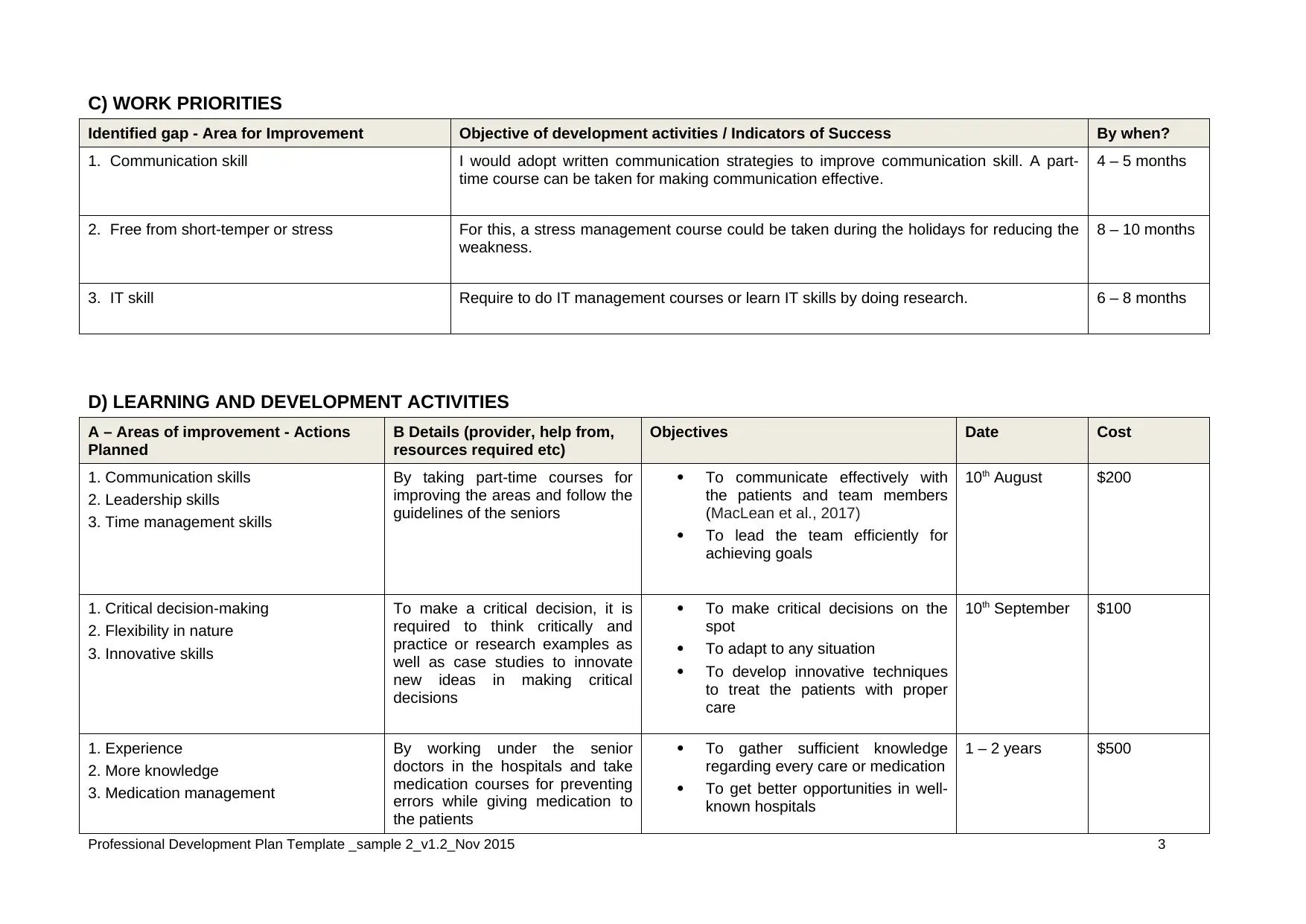
C) WORK PRIORITIES
Identified gap - Area for Improvement Objective of development activities / Indicators of Success By when?
1. Communication skill I would adopt written communication strategies to improve communication skill. A part-
time course can be taken for making communication effective.
4 – 5 months
2. Free from short-temper or stress For this, a stress management course could be taken during the holidays for reducing the
weakness.
8 – 10 months
3. IT skill Require to do IT management courses or learn IT skills by doing research. 6 – 8 months
D) LEARNING AND DEVELOPMENT ACTIVITIES
A – Areas of improvement - Actions
Planned
B Details (provider, help from,
resources required etc)
Objectives Date Cost
1. Communication skills
2. Leadership skills
3. Time management skills
By taking part-time courses for
improving the areas and follow the
guidelines of the seniors
To communicate effectively with
the patients and team members
(MacLean et al., 2017)
To lead the team efficiently for
achieving goals
10th August $200
1. Critical decision-making
2. Flexibility in nature
3. Innovative skills
To make a critical decision, it is
required to think critically and
practice or research examples as
well as case studies to innovate
new ideas in making critical
decisions
To make critical decisions on the
spot
To adapt to any situation
To develop innovative techniques
to treat the patients with proper
care
10th September $100
1. Experience
2. More knowledge
3. Medication management
By working under the senior
doctors in the hospitals and take
medication courses for preventing
errors while giving medication to
the patients
To gather sufficient knowledge
regarding every care or medication
To get better opportunities in well-
known hospitals
1 – 2 years $500
Professional Development Plan Template _sample 2_v1.2_Nov 2015 3
Identified gap - Area for Improvement Objective of development activities / Indicators of Success By when?
1. Communication skill I would adopt written communication strategies to improve communication skill. A part-
time course can be taken for making communication effective.
4 – 5 months
2. Free from short-temper or stress For this, a stress management course could be taken during the holidays for reducing the
weakness.
8 – 10 months
3. IT skill Require to do IT management courses or learn IT skills by doing research. 6 – 8 months
D) LEARNING AND DEVELOPMENT ACTIVITIES
A – Areas of improvement - Actions
Planned
B Details (provider, help from,
resources required etc)
Objectives Date Cost
1. Communication skills
2. Leadership skills
3. Time management skills
By taking part-time courses for
improving the areas and follow the
guidelines of the seniors
To communicate effectively with
the patients and team members
(MacLean et al., 2017)
To lead the team efficiently for
achieving goals
10th August $200
1. Critical decision-making
2. Flexibility in nature
3. Innovative skills
To make a critical decision, it is
required to think critically and
practice or research examples as
well as case studies to innovate
new ideas in making critical
decisions
To make critical decisions on the
spot
To adapt to any situation
To develop innovative techniques
to treat the patients with proper
care
10th September $100
1. Experience
2. More knowledge
3. Medication management
By working under the senior
doctors in the hospitals and take
medication courses for preventing
errors while giving medication to
the patients
To gather sufficient knowledge
regarding every care or medication
To get better opportunities in well-
known hospitals
1 – 2 years $500
Professional Development Plan Template _sample 2_v1.2_Nov 2015 3
⊘ This is a preview!⊘
Do you want full access?
Subscribe today to unlock all pages.

Trusted by 1+ million students worldwide
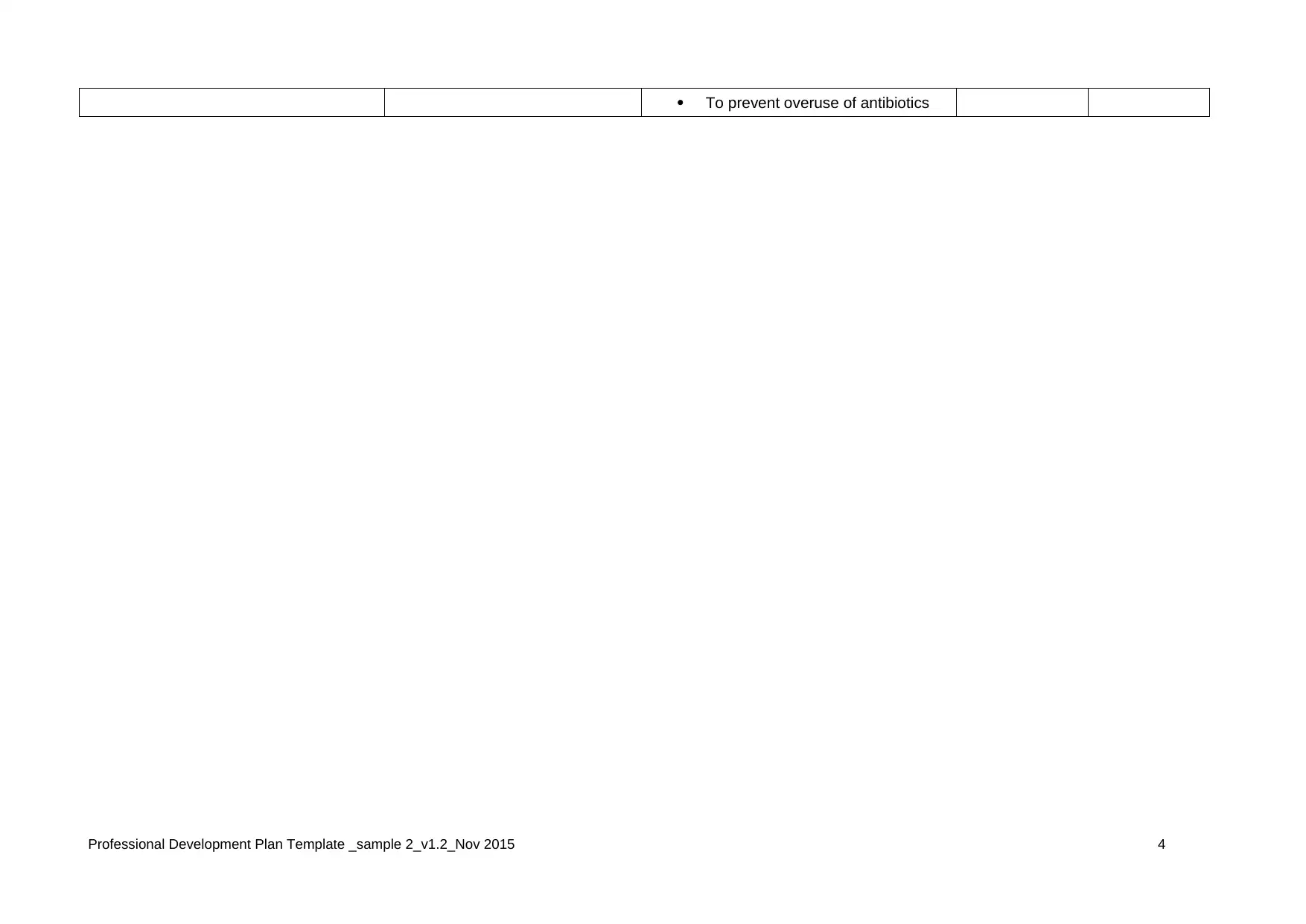
To prevent overuse of antibiotics
Professional Development Plan Template _sample 2_v1.2_Nov 2015 4
Professional Development Plan Template _sample 2_v1.2_Nov 2015 4
Paraphrase This Document
Need a fresh take? Get an instant paraphrase of this document with our AI Paraphraser
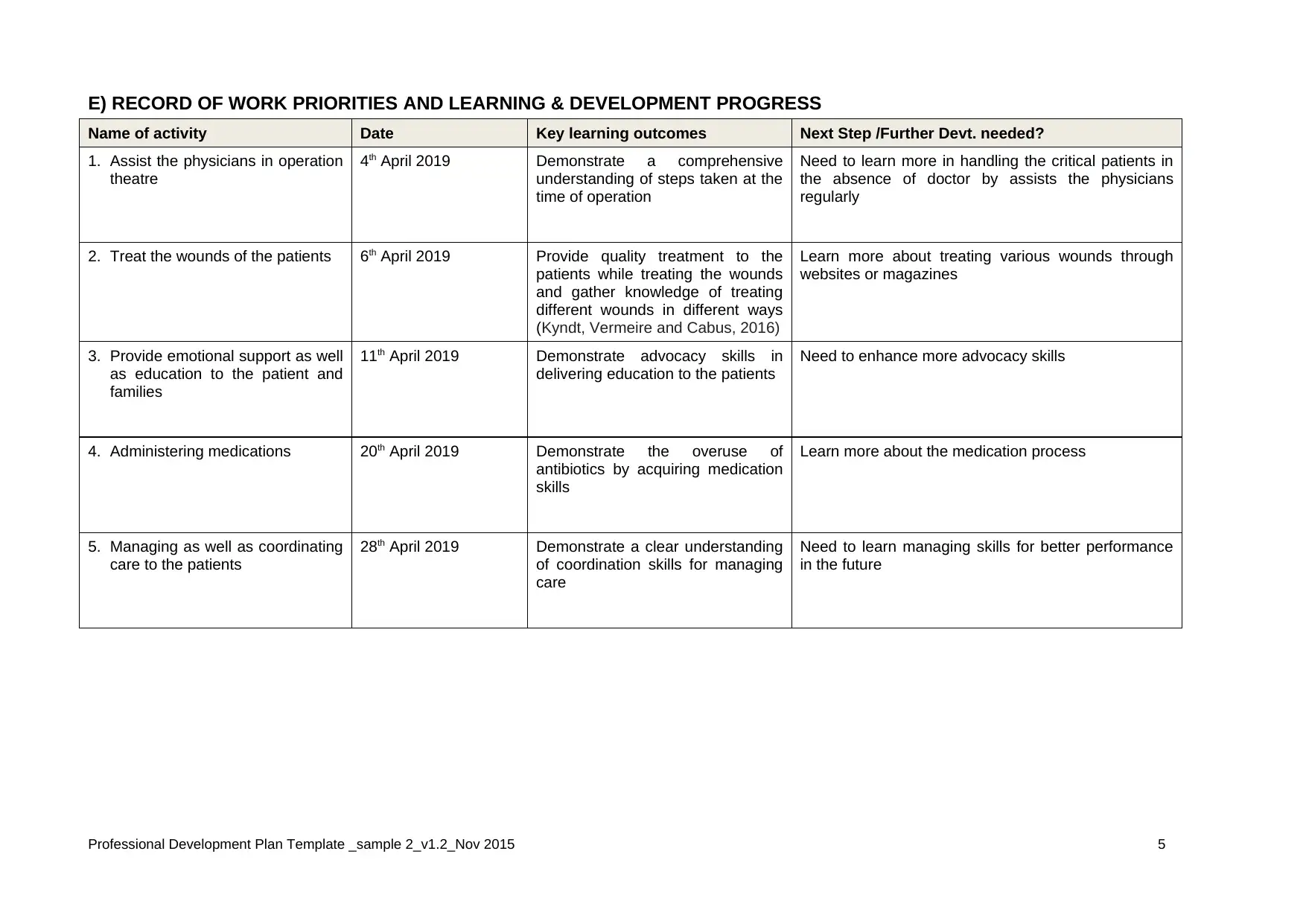
E) RECORD OF WORK PRIORITIES AND LEARNING & DEVELOPMENT PROGRESS
Name of activity Date Key learning outcomes Next Step /Further Devt. needed?
1. Assist the physicians in operation
theatre
4th April 2019 Demonstrate a comprehensive
understanding of steps taken at the
time of operation
Need to learn more in handling the critical patients in
the absence of doctor by assists the physicians
regularly
2. Treat the wounds of the patients 6th April 2019 Provide quality treatment to the
patients while treating the wounds
and gather knowledge of treating
different wounds in different ways
(Kyndt, Vermeire and Cabus, 2016)
Learn more about treating various wounds through
websites or magazines
3. Provide emotional support as well
as education to the patient and
families
11th April 2019 Demonstrate advocacy skills in
delivering education to the patients
Need to enhance more advocacy skills
4. Administering medications 20th April 2019 Demonstrate the overuse of
antibiotics by acquiring medication
skills
Learn more about the medication process
5. Managing as well as coordinating
care to the patients
28th April 2019 Demonstrate a clear understanding
of coordination skills for managing
care
Need to learn managing skills for better performance
in the future
Professional Development Plan Template _sample 2_v1.2_Nov 2015 5
Name of activity Date Key learning outcomes Next Step /Further Devt. needed?
1. Assist the physicians in operation
theatre
4th April 2019 Demonstrate a comprehensive
understanding of steps taken at the
time of operation
Need to learn more in handling the critical patients in
the absence of doctor by assists the physicians
regularly
2. Treat the wounds of the patients 6th April 2019 Provide quality treatment to the
patients while treating the wounds
and gather knowledge of treating
different wounds in different ways
(Kyndt, Vermeire and Cabus, 2016)
Learn more about treating various wounds through
websites or magazines
3. Provide emotional support as well
as education to the patient and
families
11th April 2019 Demonstrate advocacy skills in
delivering education to the patients
Need to enhance more advocacy skills
4. Administering medications 20th April 2019 Demonstrate the overuse of
antibiotics by acquiring medication
skills
Learn more about the medication process
5. Managing as well as coordinating
care to the patients
28th April 2019 Demonstrate a clear understanding
of coordination skills for managing
care
Need to learn managing skills for better performance
in the future
Professional Development Plan Template _sample 2_v1.2_Nov 2015 5
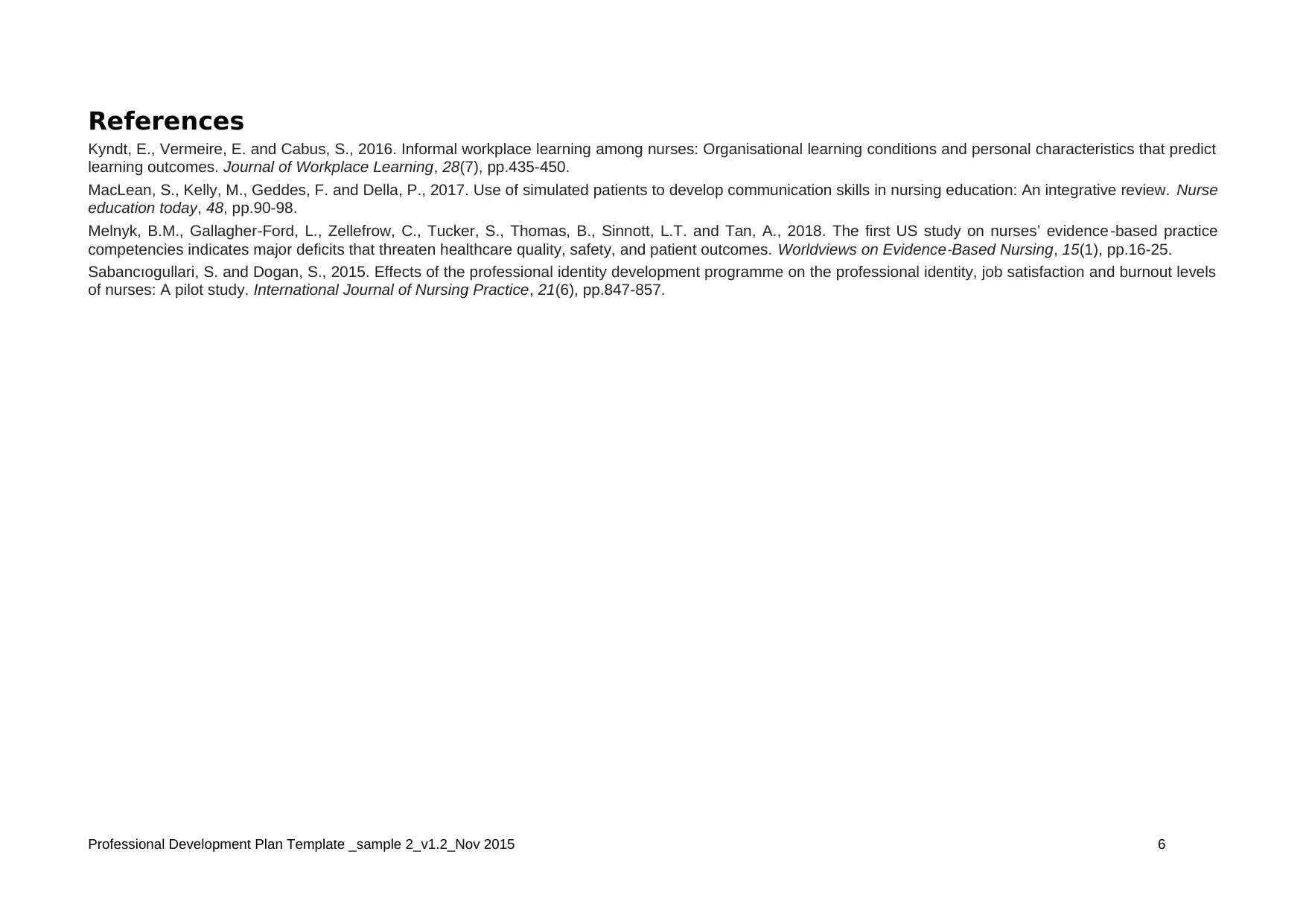
References
Kyndt, E., Vermeire, E. and Cabus, S., 2016. Informal workplace learning among nurses: Organisational learning conditions and personal characteristics that predict
learning outcomes. Journal of Workplace Learning, 28(7), pp.435-450.
MacLean, S., Kelly, M., Geddes, F. and Della, P., 2017. Use of simulated patients to develop communication skills in nursing education: An integrative review. Nurse
education today, 48, pp.90-98.
Melnyk, B.M., Gallagher‐Ford, L., Zellefrow, C., Tucker, S., Thomas, B., Sinnott, L.T. and Tan, A., 2018. The first US study on nurses’ evidence ‐based practice
competencies indicates major deficits that threaten healthcare quality, safety, and patient outcomes. Worldviews on Evidence
‐Based Nursing, 15(1), pp.16-25.
Sabancıogullari, S. and Dogan, S., 2015. Effects of the professional identity development programme on the professional identity, job satisfaction and burnout levels
of nurses: A pilot study. International Journal of Nursing Practice, 21(6), pp.847-857.
Professional Development Plan Template _sample 2_v1.2_Nov 2015 6
Kyndt, E., Vermeire, E. and Cabus, S., 2016. Informal workplace learning among nurses: Organisational learning conditions and personal characteristics that predict
learning outcomes. Journal of Workplace Learning, 28(7), pp.435-450.
MacLean, S., Kelly, M., Geddes, F. and Della, P., 2017. Use of simulated patients to develop communication skills in nursing education: An integrative review. Nurse
education today, 48, pp.90-98.
Melnyk, B.M., Gallagher‐Ford, L., Zellefrow, C., Tucker, S., Thomas, B., Sinnott, L.T. and Tan, A., 2018. The first US study on nurses’ evidence ‐based practice
competencies indicates major deficits that threaten healthcare quality, safety, and patient outcomes. Worldviews on Evidence
‐Based Nursing, 15(1), pp.16-25.
Sabancıogullari, S. and Dogan, S., 2015. Effects of the professional identity development programme on the professional identity, job satisfaction and burnout levels
of nurses: A pilot study. International Journal of Nursing Practice, 21(6), pp.847-857.
Professional Development Plan Template _sample 2_v1.2_Nov 2015 6
⊘ This is a preview!⊘
Do you want full access?
Subscribe today to unlock all pages.

Trusted by 1+ million students worldwide
1 out of 6
Related Documents
Your All-in-One AI-Powered Toolkit for Academic Success.
+13062052269
info@desklib.com
Available 24*7 on WhatsApp / Email
![[object Object]](/_next/static/media/star-bottom.7253800d.svg)
Unlock your academic potential
Copyright © 2020–2026 A2Z Services. All Rights Reserved. Developed and managed by ZUCOL.



